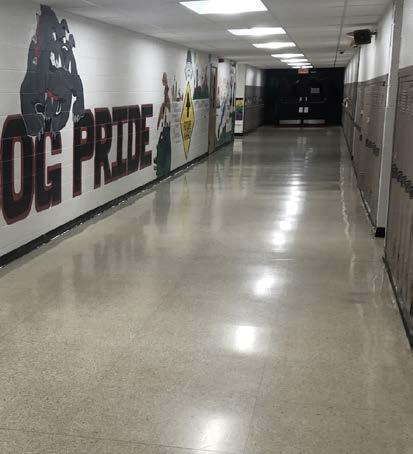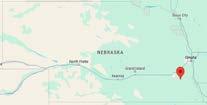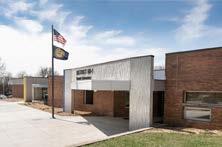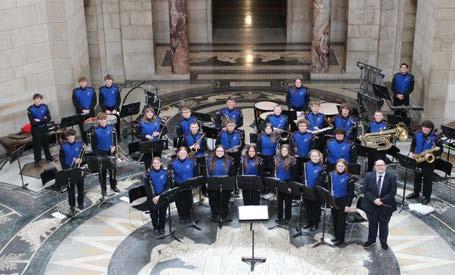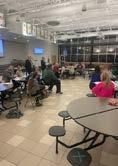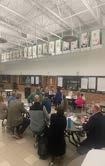NRCSA Search Service
Please let Jack Moles know where superintendent vacancies occur, so that NRCSA Superintendent Search can make direct contact. We need to hear as soon as possible in anticipation of getting promotional materials specific to that board of education ready. It is critical that Board Presidents have the NRCSA contact information so that if they choose to consider a Superintendent Search Service, NRCSA is one they hopefully will consider.
Deshler Public Schools Interim Search Complete
Fairbury Public Schools Interim Search Complete
Raymond Central Public Schools Search Complete
Sioux County Public Schools Search Complete
1
Access the Members area of www.nrcsa.net anytime.
Login: member Password: playground NRCSA
Mark Lenihan, President. Wayne Community Schools
NRCSA’s annual membership drive will begin in July. Annual Dues remain at $850. Notices will be sent in time for July board meetings. You are welcome to pay your dues in this fiscal year or the next. Last year we had 221 school districts, ESU’s, and State colleges and we expect to continue our annual growth. Thanks to you for being a member. This energizes our representation and advocacy for rural Nebraska, no matter who we are engaged with on education, legislation, or community issues. Without your support, there is less rural advocacy. Whether we like it or not, the outstate and rural population does not create a legislative majority anymore. In fact, rural Nebraska lost another seat in the Unicameral in last fall’s redistricting. Finding success, whether passing, amending, or stopping legislation comes from membership, relationships, and focus. Thanks to your membership in NRCSA, rural is at the table and making a difference on behalf of our rural students, schools, and communities.
The 2024 session of the Unicameral is complete. Below you will find a link to NRCSA’s summary of bills that were passed. A few bills that did not pass are also listed. Bills signed by Governor Pillen become effective three calendar months after adjournment (July 18, 2024), unless the bill has a specific operative date or was adopted with an emergency clause. Bills adopted with an emergency clause take effect the day after being signed. All bills not enacted at the conclusion of this year’s session are indefinitely postponed and will not carry over to the next Nebraska Legislature. They may, however, be reintroduced by a Senator as a new bill.
NRCSA Bill Summaries (Jack Moles)
The NRCSA Joe Toczek Golf Tournament will be held on Tuesday, July 23 at Meadowlark Hills in Kearney. Over the past few years we have had to turn away golfers due to course limitations. That is something we don’t like doing, especially when we have to turn away members. We have worked with the staff at Meadowlark Hills to create more opportunities for those wanting to participate. New this year is a format in which there will be two foursomes on a hole at the same time. We are working on ways to help speed up play. We are going to try it this way this year to see if it is in fact the right direction for NRCSA to go.
Golf tournament registration information was sent out the week of May 20. If you do not receive the information please contact Jack Moles at jmoles@ nrcsa.net or Jeff Bundy at jbundy@nrcsa.net.
NRCSA elections are complete for elected positions for the 2024-25 year. Ballots were recently emailed to members, with the election completed on May 1. Election results are as follows:
Executive Committee:
Dr. Dawn Lewis, Past President. Arlington Public Schools
Dr. Heather Nebesniak, Pres-Elect. Ord Public Schools
Chris Prososki, Secretary. Southern School District # 1
District Representatives:
Eugene Hanks, West Crawford Public Schools
Dale Hafer, North Central Ainsworth Community Schools
Dr. Jon Cerny, Northeast Bancroft-Rosalie Community Schs
Paul Sheffield, Southeast Exeter-Milligan Public Schools
Jon Davis, South Central Alma Public Schools
Jane Davis, Southwest Hershey Public Schools
Executive Director:
Jack Moles
Lobbyists:
Jon Edwards
Scott Moore
Russell Westerhold
Legislative Co- Chairs:
Dr. Jason Dolliver
Pender Public Schools
Bryce Jorgenson
Southern Valley Schools
Scholarship & Recognition Co Chairs:
Tim Heckenlively, Falls City Public Schools
Jim Widdifield
Minden Public Schools
2
Leadership
President-Elect - This was a Statewide position voted on by all NRCSA members. The elected candidate will serve a three-year term as President-Elect, then President, and then Past President. Candidates must be from a NRCSA member school district and membership in NRCSA must be maintained throughout the length of service. Chris Kuncl, Superintendent at Mullen, was elected as President-Elect..
West Dist Representative - Eugene Hanks is finishing his first term and was eligible to run for a second term of office. He was the only candidate on the ballot.
Northeast Dist Representative - Dr. Jon Cerny is finishing his appointment to fill Dr. Dawn Lewis’s term and chose not to run for his own term of office. Two candidates were on the ballot: Jessica Bland, Superintendent at Oakland-Craig, and Daryl Schrunk, Superintendent at Randolph. Daryl Schrunk was elected as the Northeast District Representative on the Executive Committee.
South Central Dist Representative - Jon Davis is finishing his first term and was eligible to run for a second term of office. He was the only candidate on the ballot.
Southwest Dist Representative - Jane Davis is finishing Alan Garey’s first term and was eligible to run for her own term of office. She was the only candidate on the ballot.
Committee Appointments-Executive Director Jack Moles will make recommendations to the Executive Committee to both re-appoint committee members who are eligible for a second term or to fill vacant positions on committees. The Executive Committee will act on these recommendations at its June 19 meeting. Appointees will be notified.
We have received many “kudos” on the 2024 NRCSA Spring Conference and they are greatly appreciated. Evaluations showed a couple of minor things to work on in the future, but overwhelmingly we received very positive responses. We thank everyone who was involved in making the Spring Conference a hit. Highlights of the conference included featured speakers Mark and Nanette Potter and DeMoine Adams. The Palmer Chorus and Northwest Jazz Band provided awesome musical entertainment to open two of our General Sessions. The always heartwarming awards to outstanding individuals in our rural schools and ESUs was a big highlight. NRCSA also recognized Paul Younes and Younes Hospitality and former NSAA Executive Director Jay Bellar with the Friend of Rural Education Awards.


3
COACH MARK POTTER AND HIS WIFE NANETTE DEMOINE ADAMS
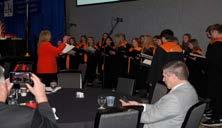
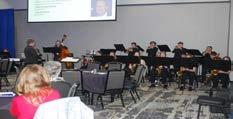
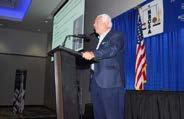
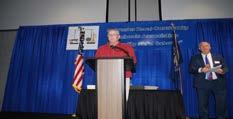
YOUNES AND YOUNES HOSPITALITY RECEIVED JAY BELLER RECEIVED NRCSA’S FRIEND OF RURAL EDUCATION AWARD
NRCSA’S FRIEND OF RURAL EDUCATION AWARD
Receiving NRCSA Awards at the Spring Conference were:
• OUTSTANDING ELEMENTARY TEACHER: Karma Ridpath (Dorchester)
• OUTSTANDING SECONDARY TEACHER: Tiffany Heins (David City)
• OUTSTANDING MUSIC TEACHER: Robin Ankrom (Falls City)
• OUTSTANDING ESU STAFF MEMBER: Brooke Kavan (ESU 7)
• OUTSTANDING SUPPORT STAFF MEMBER: Kim Fuehrer (East Butler)
• OUTSTANDING PRINCIPAL: Jamie Gorwill (Arthur County)
• OUTSTANDING BOARD OF EDUCATION MEMBER: Ken Spray (ESU 9)
• OUTSTANDING SUPERINTENDENT: Tim Heckenlively (Falls City)
4
PALMER HIGH SCHOOL CHOIR
NORTHWEST JAZZ BAND
PAUL
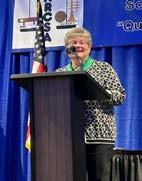
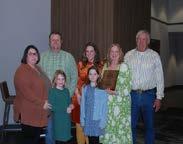
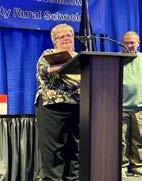

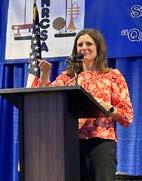

5
KARMA RIDPATH
TIFFANY HEINS
ROBIN ANKROM
BROOKE KAVAN
KIM FUEHRER
JAMIE GORWILL
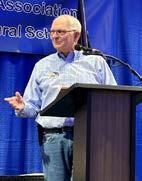
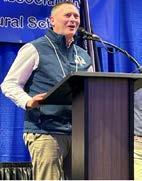
At its March meeting, the NRCSA Executive Committee made a positive move to assist nontraditional educators move toward full teaching certification. As a result of this move, new scholarship opportunities were created for paras who are in a para to teacher program and for transitional educators. NRCSA will provide three $1,000 scholarships for the fall semester and three $1,000 scholarships for the spring semester for the 2024-25 school year. Applicants for the scholarships must be current employees of a NRCSAmember district or ESU. Applicants must be enrolled for that semester in one of two types of programs: (1) in a recognized “para to teacher” program such as is offered by the three State Colleges (Chadron State, Peru State, or Wayne State), or (2) a transitional program in which a person with a minimum of a bachelor’s degree who is employed to teach in a member school while working through a transitional program, such as offered by the University of Nebraska-Kearney. The applicant would currently be teaching under a transitional certificate. Application materials are being developed and will be shared to the members in the near future. We will ask member districts/ESUs to share information on the application materials with employees who might qualify for the scholarships.

Announcement: Nebraska SMART Expansion to NRCSA
(NOTE: THE NEBRASKA STATE COLLEGE SYSTEM APPROACHED NRCSA ABOUT THE NEBRASKA SMART PROGRAM. NRCSA WAS PART OF DISCUSSIONS ON EXPANSION OF THE ORIGINAL IDEA THIS IS A GREAT OUTREACH ON BEHALF OF CHADRON STATE, PERU STATE AND WAYNE STATE)
Nebraska SMART Free Online Tutoring for K-12 Students
Nebraska SMART (Success Made Accessible through Rural Tutoring), founded by the Nebraska State College System, provides free online tutoring to K-12 students in rural Nebraska. Teacher education candidates from Chadron, Peru, and Wayne State Colleges remotely tutor students through an online tutoring platform. Click here to view the Nebraska SMART promotional video.
Nebraska SMART is expanding its service beginning in the Fall 2024 Semester to offer tutoring to K-12 students attending all school districts which are members of NRCSA (Nebraska Rural Community Schools Association). Additionally, Nebraska SMART will provide free online tutoring services to K-12 students enrolled in select
6
KEN SPRAY
TIM HECKENLIVELY
smaller non-NRCSA public school districts in Nebraska while continuing to offer tutoring to students attending school districts in Educational Service Units 1, 4, and 13. A complete listing of eligible school districts can be found on the program’s website.
How does it work?
Parents must initially register their student(s) before they can receive tutoring services. Once registered, students or parents on behalf of students can schedule a tutoring session at least 24 hours in advance. Students can also instantly be connected with a Tutor by requesting an on-demand session during tutoring hours. The Parent Guide shows how to create an account, schedule a session, join on-demand sessions, and more.
How can I find out more information about this program?
Three (3) informational webinars will be offered in August. Participants will join Julie Dickerson, Director of Nebraska SMART, to learn more about this free online tutoring program available for K-12 students in rural Nebraska. Click below to register for one of three live webinars about Nebraska SMART:
August 6, 2024 @ 2:00 PM Central Time, 1:00 PM Mountain Time
August 9, 2024 @ 11:00 AM Central Time, 10:00 AM Mountain Time
August 14, 2024 @ 4:00 PM Central Time, 3:00 PM Mountain Time
How can school districts help?
Your assistance in communicating with parents in your school district is essential to expand awareness and generate interest in this program. Below are ways that you can help:
• Share about Nebraska SMART in school/district/classroom parent newsletters
• Share about this program during your school/district Open House or Back to School nights
• Like, follow, and/or share Nebraska SMART on Facebook, Instagram, and X (Twitter)
• Share Nebraska SMART social media posts on your school/district social media pages
• Link Nebraska SMART as a student resource on your school district websites
• Share about this program with Teachers, Counselors, and other district staff
• Share about this program with Parent/Teacher Associations
• Distribute bookmarks to each K-12 student in your school/district (these will be mailed to school districts at the end of July)
• Hang posters in a visible location (these will be mailed to school districts at the end of July)
• Share with your district technology team the domain allowlist guide.
Please note that we are unable to support Pre-K students at this time; please refrain from distributing promotional materials to Pre-K students.
Marketing materials, including a bookmark for each student and a poster for each building, will be mailed to each school district (or school building) and is expected to arrive at the end of July or beginning of August. We appreciate your assistance in sharing this free online tutoring opportunity with students in your school districts.
For more information, visit: www.nscs.edu/nebraskasmart Questions, comments, or concerns?
Email: nebraskasmart@nscs.edu
Connect with Nebraska SMART on social media: Facebook: facebook.com/nebraskasmart/ Instagram: @nebraskasmart X (Twitter): @nesmarttutor
Thank you for your support in assisting with communication about Nebraska SMART in your school districts! We look forward to serving your students.
7
UNL Extension Center: Embracing Innovation: Exploring the Dynamics of New Partnerships
Developing business & Industry, organizational, and postsecondary partnerships with school districts can play a pivotal role in enriching the educational experience, supporting student achievement, and strengthening connections between schools and their communities. By leveraging external resources, expertise, and support, schools can create a more inclusive, engaging, and supportive learning environment for all students. While partnerships within school districts can bring numerous benefits, there are also challenges that may be encountered. These can be overcome by fostering a culture of collaboration, prioritizing communication and relationship-building, seeking creative funding solutions, and promoting equity and inclusivity in partnership efforts. Additionally, leveraging support from district leadership, community stakeholders, and external resources can help schools overcome obstacles and maximize the benefits of collaborative partnerships.
We in the Institute of Agriculture and National Resources (IANR), specifically the College of Agricultural Sciences & Natural Resources (CASNR) and Nebraska Extension 4-H, believe this strategy for K-12 partnerships will result in a strong learning innovation network of support for every learner and every educator in the state of Nebraska. The world of higher education is evolving, driven by changes in technology, demographics, workforce demands, and societal expectations. To meet the needs of today’s learners in the 21st century and prepare them for the challenges of tomorrow, we are embracing innovation, collaboration, and a student-centered approach.
In recent years, CASNR has created two new positions to help in this work. Dr. Tammy Mittelstet (tmittelstet@ unl.edu) is serving as the CASNR Statewide Education and Career Pathways Coordinator and Bailey Feit (bailey.feit@unl.edu) serves as the LPS/CASNR Early College and Career Pathways Coordinator. They engage in co-creating education and career pathways for students and supporting teachers by:
• creating opportunities and minimizing barriers for all learners in the exploration of education and career pathways,
• investing in and supporting teachers to innovate and integrate cross-curricular concepts of Food, Energy, Water, and Societal Systems (FEWSS) throughout K-12 education,
• encouraging our higher education institutions to share content expertise to build curriculum that will inform best practices in the areas of FEWSS and mentor future systems thinkers for the continuum of learners through our higher education institutions,
• connecting and developing a team of community leaders to build partnerships that combine resources to support student and teacher innovation, and
• building a workforce of tomorrow with the support of the industry of today by developing work-based learning opportunities.
If you would like to get monthly updates, consider signing up for the L.I.N.K.S. newsletter at https://casnr. unl.edu/k-12-partners.
Nebraska Extension brings University of Nebraska expertise and research in 8 key areas of impact directly to Nebraskans from all walks of life in each of the state’s 93 counties. Nebraskans turn to Nebraska Extension to strengthen their families, inspire their communities, empower young people, conserve and protect natural resources and advance their farms, ranches and businesses. Nebraska 4-H represents one of the eight key areas, and has been a leader in the career and college readiness field by being one of the first in the country to support a statewide educator position and team to provide leadership in program development and delivery.
The College & Career Success Team is led by Dr. Dawn Lindsley (dawn.lindsley@unl.edu) at the State 4-H Office and Jacie Milius (jacie.milius@unl.edu) in Gage County. In 4-H, we believe in the power of young people. With nearly six million members nationwide and 140,000 in Nebraska, we empower youth to lead for a lifetime. In a rapidly changing world, it’s crucial for young people to be equipped with the right mix of knowledge, skills, and experiences for their transition from education to the workforce. Through our programming, we provide developmentally appropriate, experiential learning opportunities to help youth and adults explore postsecondary education and career options, preparing them to reach their fullest potential in today’s dynamic job market. If you would like to learn more, please visit https://4h.unl.edu/programs-
8
priorities-career-college-success.
Nebraska students are the leaders, innovators, and problem-solvers of tomorrow. Through collaboration with business & industry, organizational, and postsecondary partners, school districts can provide students with invaluable real-world experiences, access to resources, and insights into the demands of the workforce. We can bridge the gap between education and employment, equipping students with the skills, knowledge, and connections they need to thrive in the competitive global economy. Together, we can create a brighter future for our students and our communities.

Use Grab and Go and Delivery for Summer Food Service this Summer
The Summer Food Service Program (SFSP) now allows Grab and Go and Delivery in eligible rural communities across our state.
With the new rural non-congregate option, made permanent in 2022, SFSP sponsors can use options made available during the pandemic each summer for bulk meals, delivery, grab and go along with Parent Pick Up meal options. In other words, kids are no longer required to be in-person to receive summer meals.
Rural sponsors using new grab and go or delivery options who are located in areas with over 50% area poverty or students using FRP meals can serve meals to all children, similar to traditional SFSP service. If sponsors are in a USDA-designated rural area but don’t meet the 50% area poverty threshold, that sponsor can still serve SFSP but must limit those free meals only to students participating in FRP meals.
This is a huge opportunity since a grab and go or delivery service almost always entails prior communication with families about the number of meals requested for a pick up or drop off. Sponsors can simply target your outreach to families already participating in free or reduced-price meals and you can reach dozens of families with multiday meals!
This new option is a great way to get meals to kids during summer! We hope you’ll consider it for this summer or the future.
Find resources below or reach out to the Nebraska Department of Ed Nutrition Services at 402-471-2488 or 800-731-2233, or via email at nde.nsweb@nebraska.gov.
Appleseed SFSP Rural Non-congregate 2-page Explainer
NDE SFSP Expansion Grant (up to $15K)
USDA map of rural-designated areas
USDA map of areas eligible for SFSP sites
NDE SFSP webpage
USDA SFSP webpage
Eric Savaiano
Economic Justice Program Manager
Food and Nutrition Access
he/him/his
Nebraska Appleseed
9
PO Box 83613 | Lincoln, NE 68501-3613
p 402-438-8853 x 126
f 402-438-0263
NRCSA has had the great privilege to work closely with Open Sky Policy Institute over the years. They provide great information on the fiscal impact of legislation that is very helpful to me in my work as NRCSA’s chief lobbyist. I would encourage Superintendents and Board of Education members to sign up to receive Open Sky’s email updates.
Open Sky has developed some awesome Nebraska Public School District Profiles instruments. It provides much information that can be used to tell the story of your district in comparison to other districts when discussing school finance. The instruments can be accessed at:
https://www.openskypolicy.org/schooldistrictprofiles
The mission of OpenSky Policy Institute is to provide impartial and precise research, analysis, education and leadership on fiscal policy-improving opportunities for all Nebraskans. Subscribe to their email updates at https://bit.ly/OpenSkyUpdates https://bit.ly/OpenSkyUpdates or contact Todd Henrichs at thenrichs@ openskypolicy.org.
At the Membership Meeting during the Spring Conference the Executive Committee presented updated NRCSA Constitution/By-Laws for approval by the membership. According to NRCSA rules, such issues must be shared with the membership prior to the meeting. The updates were approved. Below are links to a working copy with suggested revisions and an adopted copy which was voted on and approved.
Working copy
Adopted copy
The National Rural Education Association, in partnership with the Rural Schools Collaborative, has issued a study entitled WHY RURAL MATTERS. The report “looks critically at how educational supports and resources for student well-being are being distributed, casting light on which of our rural children are in need of additional support”. The study is well done and shows Nebraska in a pretty positive light. I would encourage you to take a look at WHY RURAL MATTERS, which can be accessed here:
Why Rural Matters
The National Rural Education Advocacy Coalition (NREAC) partnered with AASA in producing a report on REAP. REAP is a program that benefits many of our smaller districts. The report can be accessed here:
https://www.aasa.org/docs/default-source/resources/reports/rural-education-achievementprogram-survey-report.pdf
Understanding REAP
NRCSA is pleased to announce a partnership with New Leaf Teletherapy. New Leaf provides mental health teletherapy services for both staff and students. I became very interested in this possibility especially in terms of staff services. I know our members are working hard to provide services for their students, but there
10
does not appear to be that same capability when looking at staff services.
I look at this service as helping to bolster what your district is already doing, not to take the place of those efforts. I believe this can be a cost effective means of furthering your efforts.
NRCSA recently hosted three introductory Zoom meetings with Mark Goldman and Deb Romano of New Leaf to have them explain what the program would look like. Below you can access the slide show from those meetings, as well as a recording of one of the meetings.
New Leaf PowerPoint Presentation
New Leaf Zoom Meeting (recording)

If you would like to be in contact with Mark Goldman or Deb Romano, please feel free to call or email me and I can help make that happen.

Read the Full Blog
Board of Education meeting visits. Beginning in December, 2019, I started attending Board of Education meetings in member school districts/ESUs. Since then, I have attended 103 such meetings. I most recently attended the Board meetings at Tekamah-Herman and Oakland-Craig on Monday, April 8 and Douglas County West and Arlington on Monday, May 13. Upcoming visits to Board meetings include: Monday, June 10 at Crofton, Wausa and Osmond (non-member)
I will likely not be attending Board meetings in July. I have really enjoyed attending meetings and am willing to attend Board meetings when I can. I take a few minutes to cover NRCSA news and offerings, as well as some legislative news. When I am going to be in a specific area on Board meeting days I may send out a notice to nearby Superintendents to make an offer to visit. I’d like to be able to schedule two or three in the same evening if I can.
If you would be interested in me attending a future Board meeting, please contact me to start the arrangements. I would also be willing to “attend” your Board meetings via Zoom if you preferred. I would still only do one at a time but would be able to do several in the same evening. Let me know and we will try to make the connection.
11
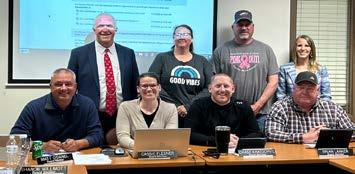
The American Heart Association is committed to partnering with schools in rural Nebraska to improve the health of their communities. A few of these opportunities include:
Tobacco Free Schools. Unfortunately, recent data reveals the ongoing challenges of youth tobacco use. The 2021 National Youth Tobacco Survey showed that: Approximately 2 million MS/HS students reported using e-cigarettes during the pandemic; nearly 85% of them used flavored tobacco products. More than 4 in 10 HS students and nearly 2 in 10 MS students who used e-cigarettes did so 2 out of 3 days and youth showed a strong brand preference.
Many schools have struggled to keep up with the continued innovation of the tobacco industry. To help address that, the American Heart Association created our Tobacco Free Schools Toolkit. The toolkit is designed to help schools update their policies so that now – and in the future – they will cover all products, people, and places while providing mechanisms that support students who are battling tobacco addiction. More information/ resources are here.
Improving Cardiac Response in Schools. In the aftermath of a cardiac emergency -minutes matter. The Chain of Survival starts with those who are present and requires everyone to do their part. This is especially true in rural communities where EMS resources are often further away. We recently launched a series of new tools to help schools, youth sports, and other entities develop Cardiac Emergency Response Plans. These plans consider: access to functioning AED’s, a strong base of CPR knowledge and training, as well as the identification of a response team and the annual practice of a cardiac emergency.
For questions about these or other initiatives, please reach out to Tim Nikolai, Sr. Rural Health Director, at Tim. Nikolai@heart.org.
A note from Mr. Nikolai:
For those I have not met previously, I am the American Heart Association’s lead for rural health in the Midwest Region, inclusive of your states. My role allows me to work collaboratively with all manner of organizations that are in a position to impact health in their communities – and schools are certainly near the top of that list.
There are many ways our organization has worked to collaborate with schools – supporting access to nutritious, affordable food, helping to address the ongoing challenges of vaping/tobacco use, and more. Today, though I’m focusing primarily on our resources to assist with cardiac readiness / cardiac emergency response planning.
Much of the country was watching – or has followed since – the collapse of Buffalo Bills’ safety, Damar Hamlin, on Monday Night Football. Fortunately, Damar’s story had a happy ending. Our goal is to
NRCSA EXECUTIVE DIRECTOR JACK MOLES WITH THE ARLINGTON BOARD OF EDUCATION & SUPT. DAWN LEWIS
12
maximize the opportunity for everyone to have a similar outcome should they experience a Sudden Cardiac Arrest. Most organizations will not have the resources that the NFL does to ensure player safety, but there is much that can be done, especially with proper planning.
Some data suggests that nearly 1% of schools will be the site for an out of hospital cardiac arrest annually. For a variety of reasons, rural areas are disproportionately impacted by both rates of cardiac arrest and poor outcomes. We know that prepared and equipped schools mean better outcomes for staff, students, visitors, and the communities that so often gather in school spaces.
We have recently built out/updated a variety of tools to assist schools – and other organizations – with their cardiac readiness. These include:
• Sample Cardiac Emergency Response Guidelines and Plans.
• A toolkit to maximize the impact of AED placement and implementation.
• Training and awareness tools to help with Hands-Only CPR knowledge for staff and students.
• A revamped, training site search feature, for coaches, nurses, and others who need CPR certification.
• In some cases, we may have – or be able to help secure – financial resources to help schools with purchasing/ maintaining AEDs, CPR mannequins, etc. Hearing the scope of that need can help us secure additional resources, so please let us know!
Please let me know if you see an opportunity or need to dialogue about these resources further or share them with your member districts. I’m happy to assist with newsletter copy, join or host webinars, or other ideas that fit your standard means of communication.
Finally, at the risk of sharing too much – a few other notes I wanted to highlight.
• I’ve attached an invitation for our Fall Educator Series. Administrators/Educators from all districts are welcome to attend the sessions they are interested in. You’ll see the one in November is on Cardiac Emergency Response Planning.
• Last year some 1300+ rural schools in the Midwest participated in our Kids Heart Challenge program. They raised life-saving money for our mission, earned PE equipment for their schools, and helped improve health knowledge in their community. Last year, tens of thousands of families learned Hands-Only CPR through the program.
• Thanks to the Missouri Rural Health Association for sharing our HeartCorps program on their home page. That opportunity exists for IA, KS, KY, MN, MO, NE, OH, and WI. Happy to chat more!
American Heart Association Service Summary
Farm to School Network Takes Root in Nebraska
The Nebraska Department of Education, Center for Rural Affairs, Nebraska Extension, Buy Fresh Buy Local, and No More Empty Pots are pleased to announce the establishment of the Farm to School Network in Nebraska. The network aims to increase access to fresh and nutritious foods in Nebraska schools and strengthen connections between local farmers, educators, and communities.
To build this network, a Network Development Committee and Advisory Committee will lead the process and guide stakeholders to create a strategic, collective action plan that will move farm to school forward in Nebraska. The Network Committees are made up of representatives from key organizations and institutions across the state and are focused on breaking down barriers standing in the way of implementing farm to school initiatives.
The Network Committees will begin the network building process with mapping community assets, phase one of the Nebraska Farm to School Network Timeline. Through this phase, they will collect information on existing farm to school activities in the state and establish a vision for the network.
13
All stakeholders interested in building a stronger and healthier food system in Nebraska may participate in upcoming virtual and in-person listening sessions. These listening sessions will take place from October 10th to 18th and provide a platform for sharing information about current farm to school activities and discussing the future vision for the network.
“Pillars to farm to school success in a state include partnerships, policies, and supportive programming. A network will support development of these initiatives,” said Sarah Smith, Nebraska Department of Education Farm to School Specialist and Project Director.
To register for the listening sessions or to learn more about the Nebraska Farm to School Network, please visit the Network’s webpage.
Southern Superintendent Chris Prososki has shared a sample Superintendent Checklist that he uses. I thought this was a great instrument, one that I wished I had available to me when I was in the Superintendency. It can be especially helpful as you head into the new school year! Thanks to Chris for sharing this! You can access the updated checklist here:
Superintendent Check List
The ESUCC and ESU 3 have shared a document which outlines all of the trainings and mandates that are required of districts. The document, “School District Plans, Policies, and Annual Trainings Requirements”, is a handy reminder for districts. Thanks to ESUCC Executive Director Kraig Lofquist and ESU 3 Administrator Dan Schnoes for developing and distributing this handy tool. The document may be accessed here:
School District Plans, Policies, & Annual Trainings
We urge you to consider participation in the NRCSA Partner OneCard program as a tool for you in managing school expenditures, both large and small. Certainly, the card can help reduce/eliminate any issues relative to unverified cash expenditures. You decide who uses it, can get cards for each of those users, keep all cards wherever you wish, determine the amount to load on each individual card, and how long the time frame of use is. It is a terrific management tool and clearly identifies each expenditure/name/date/amount. Whether small purchases or very large purchases, the card is a terrific tool. NRCSA owns the state contract, so liability for misuse falls to NRCSA, not the district user. We have only had three circumstances of fraud and all three have been the theft of the card number information, not any district employee misuse. For 2023-24, 98 districts/ESUs participated in the program. We have received interest from several districts already this year, so we believe we will end up with over 100 entities using the program. Great job by all participating districts in protecting the card and program! Don’t forget, the NRCSA rebate from the transaction fee paid by businesses that choose to accept plastic is used for scholarship, awards, and special needs. For 2023-24, the rebate was over $30,000 to NRCSA, showing that use is increasing, and large purchases are being included. WIN, WIN, WIN! If you are considering joining the program and need more information, please contact Jack Moles (jmoles@nrcsa.net) or Jeff Bundy (jbundy@nrcsa.net).
14

NRCSA wishes to share in the celebration of the special accomplishments and recognitions going on in our member schools and ESUs.
June 2024:
* Conestoga successfully passed its bond election.
* Malcolm won the Class C State Baseball championship.

MALCOLM–2024 STATE BASEBALL CHAMPS!
* Lexington was the runner-up in the Class B State Boys Soccer Tournament.
* It was a record setting year in High School Track and Field, with 45 all class, class, and State Track Meet records set. Athletes from NRCSA member schools had a hand in many of those records. They include:
• Adi Hunt, Southern Valley–Class D and Class D State Meet records in the Girls 100.
• Clara Spargo, Dundy County Stratton–Class D and Class D State Meet records in the Girls 400.
• Chloe Ahrens, Sidney–Class B and Class B State Meet records in the Girls 100 Hurdles.
• Karsyn Leeling, Sidney–All Class and Class B records in the Girls High Jump.
• William Kulhanek, Overton–Class D and Class D State Meet records in both the Boys 100 and Boys 400.
* NRCSA-member schools were successful at the State Track Meet. Team placings include:
• Chase County was the Class C Boys champion, while Arlington finished as runner-up.
• McCool Junction and Axtell tied for the Class D Boys championship.
• Niobrara/Verdigre was the Class D Girls champion and Southern Valley was the runner-up.
•
15

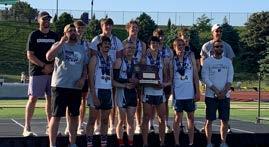
MCCOOL JUNCTION BOYS TRACK TEAM AXTELL BOYS TRACK TEAM
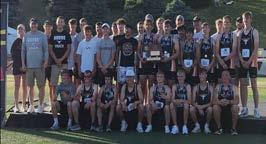
CHASE COUNTY BOYS TRACK TEAM
* Athletes from NRCSA-member schools who won events at the State Track Meet included:
• WHEELCHAIR 200: Grant Wahlgren, Gothenburg
• CLASS B GIRLS: Madison Smith, Gothenburg (Discus), Karsyn Leeling, Sidney (High Jump, Long Jump, Triple Jump), Chloe Ahrens, Sidney (100 Hurdles), Addison Darnell, Auburn (300 Hurdles)
• CLASS B BOYS: Brett Fraker, McCook (Triple Jump), Boston Irish, Cozad (Pole Vault)
• CLASS C GIRLS: Sarah Forsberg, Cross County (Long Jump), Caitlin Guenther, Crofton (Discus), Ponca (4 x 800), Kaitlynn Kratz, West Holt (High Jump), Jaid Wehrle, Battle Creek (Shot Put), Jordan Metzler, Wakefield (800), Hailey O’Daniel, Arlington (1600), Ashlynn Vestal, Syracuse (300 Hurdles), West Holt (4 x 400)
• CLASS C BOYS: Samuel Clements, Elmwood-Murdock (Shot Put), Blake Hinrichs, Ord (Triple Jump), Arlington (4 x 800), Mason McGreer, Perkins County (1600, 3200), Jordan Settles, North Bend (Pole Vault), Derek Wacker, Yutan (Discus), Carter Nelson, Ainsworth (Long Jump), Christopher Thomas, St. Paul (800), West Holt (4 x 100), Mitchell Hupp, Stanton (100, 200), Easton Fries, Chase County (300 Hurdles), Chase County (4 x 400)
• CLASS D GIRLS: Janna Roberts, Osceola (Pole Vault), Kennedy Bailey, Dundy County Stratton (Discus), Adi Hunt, Dundy County Stratton (Long Jump, 200), Clara Spargo, Dundy County Stratton (400), Delani Runnels, Niobrara/Verdigre (3200), Ann Bose, Southern Valley (High Jump), Chloe Anderson, Loomis (Shot Put), Adysen McCarter, Overton (Triple Jump, 100), Myleigh Weers, Diller-Odell (800), Central Valley (4 x 100), Ashley Robertson, Wallace (1600), Teya Boyer, Plainview (300 Hurdles), Elm Creek (4 x 400)
• CLASS D BOYS: Justin Folkers, Twin Loup (High Jump), Boone Snyder, Sutherland (Shot Put), High Plains (4 x 800), William Kulhanek (Long Jump, 100, 200, 400), Carson Trompke, Cambridge (1600,
16
3200), Lucas Hodges, Elm Creek (Pole Vault), Luc Lopez, Axtell (800), McCool Junction (4 x 100), Spencer Hille, Plainview (300 Hurdles), McCool Junction (4 x 400)
* Nebraska Game and Parks announced the first All State Archery Team and the Academic Archers in the National Archery in the Schools Program. Five of the students who were recognized are from NRCSA member Milford: Allie Gerdes, Sydney Havlat, Natalia Nutzman, Ayla Salistean, and Chris Wissenburg.
* Overton won the Class D Boys State Golf Championship. Hitchcock County finished as the runner-up.
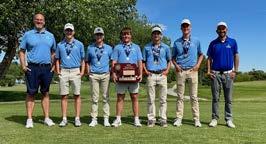
OVERTON BOYS GOLF–CLASS D STATE CHAMPIONS
* Samuel Wells of St. Paul was the individual champion in the Class C Boys State Golf Tournament. Jake Dane of Sandy Creek was the individual champion in the Class D Boys State Golf Tournament.
* Athletes from NRCSA-member schools were honored with inclusion on the All State Soccer Teams by the Omaha World-Herald (OWH) and Lincoln Journal-Star (LJS). Those included on the teams were:
• BOYS ALL-CLASS 1ST TEAM: Jose Cruz, Schuyler (OWH & LJS)
• BOYS CLASS B 1ST TEAM: Jose Cruz, Schuyler (OWH & LJS), Alexander Perez, Lexington (OWH & LJS), Edyn Cruz-Lima, Lexington (OWH & LJS), Fernando Casillas, Lexington (LJS)
• GIRLS CLASS B 1ST TEAM: Evie Keller, Northwest (LJS)
* S helly Mowinkel, of Milford, was honored as the Association for Career and Technical Education of Nebraska (ACTEN) Outstanding Business Teacher of the Year.
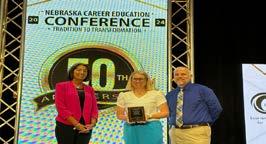
17
The National Rural Education Advocacy Consortium (of which NRCSA is a member) continues to represent rural education on the Federal level. NREAC is an extension of the National Rural Education Association. NRCSA Executive Director Jack Moles and NRCSA Legislative Committee Co-Chair Bryce Jorgenson (Supt. at Southern Valley) attended the NREAC Federal Legislative Summit in Washington DC on April 28-30.
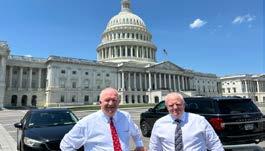
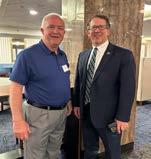
NRCSA EXECUTIVE DIRECTOR JACK MOLES AND NEBRASKA CONGRESSMAN ADRIAN SMITH
Bryce and Jack met with the offices of each of Nebraska’s contingency in Congress. They specifically shared three points of emphasis with them:
• Copies of NREA’s publication, “Why Rural Matters” was presented to each of the offices.
• Full funding of IDEA was stressed. This would bring about $171 million more to Nebraska public schools in support of Special Education services.
• Passage of the Secure Rural Schools Reauthorization Act of 2023. This would bring about $180,000 to school districts surrounded by tax-exempt public lands.
A brief description of the six NREAC legislative priorities are as follows:
1) EDUCATION FUNDING: NREAC seeks preservation of critical federal funding for rural schools.
2) REAP FUNDING: NREAC urges Congress to increase funding to Title V, Part B of ESSA, the Rural Education Achievement Program, with a specific increase to the Rural Low-Income School Program.
3)INFRASTRUCTURE: NREAC supports efforts to ensure any infrastructure proposal in Congress must include funding for modernizing or maintaining rural school facilities.
4) FOOD AND NUTRITION: NREAC supports any effort to streamline processes and reduce the administrative burdens related to school meal programs.
5) SCHOOL SAFETY: NREAC supports flexible federal formula funding streams that channel resources to rural school districts for school safety that recognizes the geographic and economic challenges in rural communities.
6) BROADBAND AND CONNECTIVITY: NREAC believes access to high-speed internet is critical for providing equitable access to learning for students in rural schools. As such, NREAC strongly supports maintaining E-Rate as an element of the Universal Service Fund in its current funding structure.
NREAC Legislative Agenda
Last school year, NRCSA began a Principal Search Service. This service is patterned after our successful Superintendent Search Service. Two options are available. Both options will involve NRCSA consultants recruiting candidates for the position. One option will involve the NRCSA consultant making background calls, while the reduced version of the service will place that role with the Superintendent. If you are interested in getting more information about the service now, please contact Jack. Here is a brochure outlining the service.
NRCSA Principal Search Brochure
18
JACK MOLES AND BRYCE JORGENSEN AT THE U.S. CAPITOL
An outstanding opportunity is available for rural districts or ESUs to “grow their own” School Psychologist. I highly encourage someone in your school or ESU to apply for admission to the Prairie Nebraska Project through UNL.
With generous funding from the Behavioral Health and Education Center of Nebraska, the University of Nebraska Lincoln’s School Psychology program is recruiting 10 rural Nebraska residents to complete an Educational Specialist degree in School Psychology. The Prairie Nebraska project uses synchronous and asynchronous online instruction to deliver a program of study that is highly accessible for rural Nebraska residents. Students will be able to complete the training in their own community without having to relocate to Lincoln. Prairie Nebraska funds will pay for the trainees’ tuition and fees. Upon successful completion of the program, Prairie Nebraska trainees will qualify for an endorsement towards a Nebraska Department of Education certificate in School Psychology.
Successful applicants to the Prairie Nebraska program will:
• Live and work in any Nebraska county excluding Douglas, Lancaster, Sarpy, Washington, or Cass Counties.
• Have a recommendation from an ESU or school administrator with a commitment by the school/ ESU to provide the experiences and supervision that trainees will need to complete the program.
• Apply to and be accepted into the University of Nebraska Lincoln Educational Specialist program in School Psychology.
Due to restrictions associated with the ARPA funds, all project-funded activities must be completed by December 2025. Consequently, we will be recruiting very quickly – with review of applicants beginning on April 1, 2023 and continuing until the program is filled. Coursework and supervised practica will be tightly scheduled and offered one course at a time. Formal, synchronous courses and meetings will be scheduled outside of typical work hours (e.g., 5 PM or later) and will emphasize projects, assignments, and activities that have practical utility to prepare students for dayto-day practice as School Psychologists.
Interested applicants should email Beth Doll, bdoll2@ unl.edu and include their:
• Name, email, and phone number
• Mailing address, including county of residence
• The school district or Educational Service Unit
that is likely to provide their recommendation and commitment for supervised experiences
New Collaboration Seeks to Address Principal Shortage and Strengthen Professional Development
A new collaboration designed to address the shortage of future principals and strengthen professional development of current school leaders is underway. The project, entitled, Growth-Oriented Leadership Development (GOLD) is being coordinated by members of the UNL Department of Educational Administration, in partnership with NRCSA, NCSA, ESUs, and NDE.
“We’re seeking federal funds to develop current and future principals from within—a grow your own model, said Nick Pace, chair of the UNL Educational Administration Department. Over the next several months, Pace says a team led by professors Jiangang Xia and Scott Sturgeon will be inviting districts to join the effort. The team is inviting approximately 60 schools to participate, with half receiving focused training while the other half continues its current efforts without the training. Districts not initially selected for the training group would be first in line for the next round of the program, if funded.
Districts interested in participating should watch for information through NRCSA updates, ESU superintendent meetings, or by contacting Pace, Xia, or Sturgeon.
Nick.Pace@unl.edu, Jxia@unl.edu, ssturgeon2@ unl.edu
NRCSA developed a corporate sponsorship/ partnership program. The program is designed to provide our corporate partners with more opportunities for contact with the decision makers in our member school districts, ESUs, and the colleges through increased exposure. Corporate partners are able to choose among three levels of sponsorship: Purple Ribbon Partners, Blue Ribbon Friends, and Red Ribbon Sponsors. Different forms of contact with our members are made available in each of the three levels.
All of NRCSA’s Purple Ribbon Partners exhibited at the NRCSA Spring Conference.
19

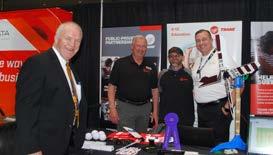
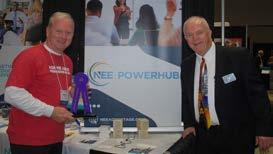
Network for Educator Effectiveness
20
Trane

Maxwell Public Schools

Mascot: Wildcats
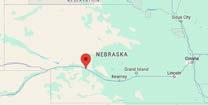
Enrollment: 265 students
Location: Maxwell, NE
Interesting Fact: The Village of Maxwell has a population of 252 and the enrollment at Maxwell Public Schools is 265
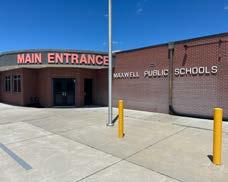
Superintendent: Danny McMurtry
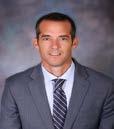
Principals: - Missy Friend (Elementary Principal), Eamonn Feeney (Secondary Principal)
Board of Education: President - Casey Meyer. Vice President - Robyn Huffman. Secretary - Monica Breinig. Treasurer - Todd McKeeman, Members - Shaun Pagel, Levi Gosnell
25
Programs
In her third year as play production sponsor, coach Sheelagh Lucas took the Wildcats all the way to a third place finish at the state competition. The Wildcats won both the district and RPAC competitions this year. As a matter of fact, they swept the conference awards. Senior Liselle Lucas won best actress at both district and conference competitions and the Wildcats won best technical show as well. Coach Lucas and her students put in a tremendous amount of work throughout the year and it showed. Their progress throughout the season was very impressive. The Wildcats are very excited about the future as they only graduate two seniors that participated.
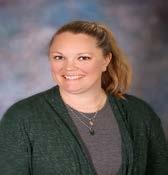
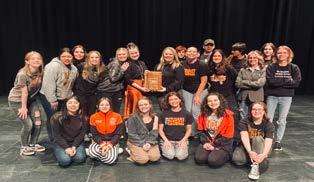
Maxwell Public Schools prides itself on a family atmosphere. That is for both students and staff alike. We work intentionally to create a safe and enjoyable environment for everyone. The relationships formed by those throughout the building create a strong culture. And that culture is largely responsible for the district not losing a single teacher this year!
26
I would encourage districts to consider participating in the Academic Decathlon competition. Academic Decathlon is an activity that is dependent on students of different ability levels. A team is made up of students who are in the Honors (A average), Scholastic (B average), and Varsity (C average) levels. Students may move up, but they may not move down. The combined scores of the students in all 10 competition events are counted, thus each team member is very important. There is a defined course of study in each subject area each year. Subject areas are commonly Math, Language & Literature, Science, Social Science, Economics, Art, and Music which are covered in the Regional competition each year. At the State Competition, Speech, Interview, and Essay are added. There is a “theme” each year that many of the subject areas cover. The theme for 2022-23 was the American Revolution. The theme for 2023-24 will be “Technology and Humanity”. Regional competition takes place in January and State competition takes place in February. The school can decide how to prepare for the competitions. Some schools have teams that have practices in the evenings or after school. Some simply provide the students with materials to study prior to competitions. Other schools offer a class to prepare.
Quiz Bowls are wonderful and fun activities, but they do not have a defined course of study like the Academic Decathlon. I find the Decathlon to be the best academic competition that I have experienced. To me, it is based on true study and learning.
This year as I worked the State Academic Decathlon Championships, I had an opportunity to connect with great kids from NRCSA-member districts Adams Central, Johnson County Central, and Lexington.
On a personal note, three of my four kids participated in Academic Decathlon through high school and between them they won thousands of dollars in scholarships as they were on teams that had success. I currently serve on the Nebraska Academic Decathlon Board of Directors. I have been very involved with this activity for many years and highly encourage you to consider adding it to your school. A new school can have its enrollment fee waived the first year and may receive free study materials.
If you have any questions or have a staff member who is interested, please feel free to contact me. You could also contact the State Director, Vicki Deniston-Reed at dcthln.denistonreed@gmail.com.
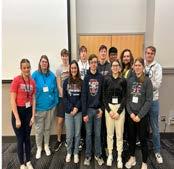
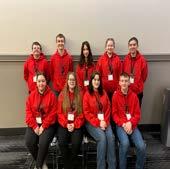
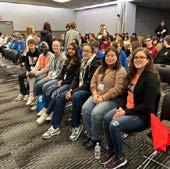
UNL Tuition Discount & GOLD Grant.
We have a new tuition discount program aimed at better serving folks from rural districts who are seeking school leadership degrees (MEd – principalship, EdD – superintendency) or endorsements. The program provides a 15% tuition discount for educators who
27
ADAMS CENTRAL ACADEMIC DECATHLON TEAM
JOHNSON COUNTY CENTRAL ACADEMIC DECATHLON TEAM
LEXINGTON ACADEMIC DECATHLON TEAM
serve in NRCSA member districts or are in an area classified by NCES as rural or town. We think this is a small but important step toward helping rural schools be intentional about growing their own leaders. If interested, please contact Dr. Nick Pace at nick.pace@ unl.edu
Big Red Leader Website
Big Red Leadership Flyer
In addition, invite your participation in a federal grant application aimed at helping Nebraska school districts. Led by the UNL Department of Educational Administration, the GrowthOriented Leadership Development (GOLD) Project is a collaboration across NCSA, NRCSA, ESUCC, and NDE. Goals include:
• Developing current and future leaders in a growyour-own model
• Strengthening School Leadership
• Improving Principal and Teacher Retention
GOLD Highlights:
• A focus on local, building/district level context, not a top-down, one-size-fits-all approach
• Research-based content aligned with Marzano’s Balanced Leadership and other recent work
• Use of existing professional development structures led by credible leaders and coaches
• No additional costs or duties to ESUs or districts
GOLD Includes:
• Regular, large group professional development for the principal and 2-3 teacher leaders per building
• Small group coaching and facilitation provided by grant-funded coaches
• Application of material presented in sessions to local school improvement priorities and integration with the new NDE Nebraska Teacher and Principal Professional Standards (NTPPS)
• A stipend to participating schools to support implementation of GOLD dimensions and materials
To Learn More: https://cehs.unl.edu/edad/gold-project/
Chadron State College Special Education Parato-Teacher Program Initiative.
Purpose: This “Grow Your Own” Special Education Teacher program is designed to provide school districts with the opportunity to cultivate and participate in the training of their para-professionals who wish to continue their education to become special education teachers.
Who: Any individual who holds a minimum of an Associate’s Degree (or equivalent credit hours) from an accredited higher education institution, and who is employed as a para-professional within a school district. What: Chadron State will provide required course work and enrichment activities via online, face-to-face (via Zoom), and on the job experiential learning, leading to a Bachelor’s in Education Degree, and a Nebraska Teaching Certificate with an endorsement in Special Education (grades PK-12). With administrator input, program course work will be tailored to best fit your district practices and expectations. Each course will be offered in an 8-week format, with 12-13 credit hours to be completed each 16 week semester. How: Program participants will be advised, monitored, and supported by CSC faculty/staff, and a CSC Education Program liaison is specifically assigned to facilitate their progress. District para-professionals may enter the program at any time in the academic year.
When: once participants reach their senior academic year they will embark on completing their capstone course work, via online and Zoom class sessions. This course work has been pared down considerably with the understanding and assumption that these student teachers will be learning “on-the-job”. For example, one section covers classroom management practices. Clearly, one can argue and attest that these student teacher interns are learning more about managing a classroom from being mentored by veteran teachers within your school, and observing them in action. This is the belief and learning approach embraced during this senior year. However, to ensure and assess concept learning, Chadron State faculty will be meeting with your student teacher cohort twice per week for 1.5 hours, via Zoom conferencing technology.
Graduation: At the completion of this program students/candidates graduate from Chadron State College, and apply for teaching licensure resulting in a valid initial teaching certificate with and endorsement in PK-12 Special Education. Chadron State’s education program in nationally and State accredited. As such, interstate certification reciprocity is not a problem.
28
Things for your consideration:
1) To qualify for this program participants must hold at least an Associate’s Degree or the equivalent in college credit hours. (CSC will work with those applicants to provide them with the needed coursework leading up to program entry).
2) Districts must agree to maintain para-professional employment throughout the course of the program— including during the student teaching experience.
Please contact Dr. Adam Fette for more program information, at afette@csc.edu.
The UNL Department of Educational Psychology has received a grant from the Swanson Foundation which allows them to offer mental health services to rural schools.
From Dr. Michael Scheel, Chair of the UNL Department of Educational Psychology:
The UNL Department of Educational Psychology would like to offer counseling and psychological services, as well as consultation services to the schools and communities of Southeast Nebraska. We run a mental health counseling and therapy clinic and we are offering counseling and consultation services to teachers, administrators, students, and community members of Southeast Nebraska. Services will be provided through remote and confidential means (i.e., Zoom conferencing). We are hoping that schools, families, and individuals contact us to schedule an appointment for a telehealth counseling or consultation session.
We have recently learned that a donor will support our work with individuals living in rural Southeast NE by paying all fees for services. Thus, whoever seeks out our services will simply have to indicate they live in Southeast Nebraska, and any services we provide will be paid for through the UNL Foundation. Individual, couple, and family counseling will be provided without financial expense. Additionally, we can provide teachers, school administrators, school counselors, and school social workers consultation services for students of their schools without charge.
We are very excited to enter a partnership with schools and communities of SE Nebraska to promote mental health and well-being. We are aware of the mental health counseling disparities that exist in Nebraska
rural areas, and our department, our College of Education and Human Sciences, and UNL are highly interested in offering our expertise and resources with the goal of enhancing the well-being of SE Nebraska individuals, schools, and communities. We are a group comprised of licensed psychologists and psychology graduate students who regularly provide services through our clinic to the Lincoln community. We are seeking to reach beyond Lincoln to connect more with surrounding rural areas. We also are acutely aware of the importance of addressing mental health concerns right now as we all are experiencing the stress of going through the COVID-19 pandemic.
The Counseling and School Psychology Clinic is a training clinic in which graduate students in counseling and school psychology work with clients under the supervision of licensed psychologists. Services are available to all on a sliding scale. For clients from SE Nebraska communities, services will be paid for through UNL Foundation funds supplied by a donor who cares deeply about the welfare of schools and communities in SE Nebraska. Counseling services are offered to improve well-being, improve academic and behavioral issues, stabilize mood, manage stress, and improve life-adjustment issues.
For more information, please visit our clinic website: https://cehs.unl.edu/edpsych/clinic/
A common theme from some of the decision makers on the state level is that “out of control” local spending is to blame for the property tax problem. NRCSA, along with many other educational entities, maintains that we do not have a school spending issue, but instead have a school funding issue. Attached are two reports, one from NRCSA, the other from Open Sky, that discuss the myth of “out of control” school spending. It is my hope that administrators and Board of Education members will read, then use these reports to counter those claims. When you do please tell your district’s story as that is the most powerful way to get this message across.
NRCSA Spending Study
A Look at School Spending in NE from Open Sky
29

